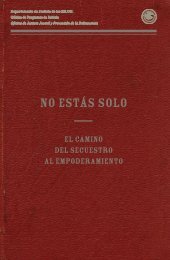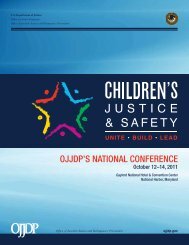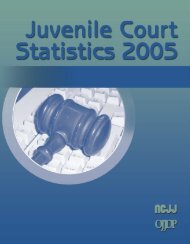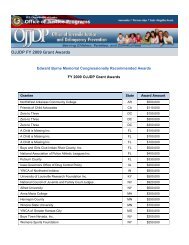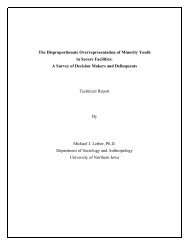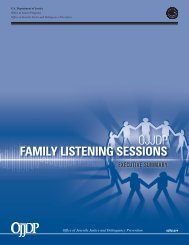Guideline - Office of Juvenile Justice and Delinquency Prevention
Guideline - Office of Juvenile Justice and Delinquency Prevention
Guideline - Office of Juvenile Justice and Delinquency Prevention
Create successful ePaper yourself
Turn your PDF publications into a flip-book with our unique Google optimized e-Paper software.
UNITED STATES<br />
DEPARTMENT OF JUSTICE<br />
OFFICE OF JUSTICE PROGRAMS<br />
<strong>Guideline</strong><br />
OJP G 4062.8A<br />
<strong>Office</strong> <strong>of</strong> <strong>Juvenile</strong> <strong>Justice</strong> <strong>and</strong> <strong>Delinquency</strong> <strong>Prevention</strong><br />
(OJJDP) Peer Review <strong>Guideline</strong><br />
Purpose<br />
This guideline establishes the procedures the <strong>Office</strong> <strong>of</strong> <strong>Juvenile</strong> <strong>Justice</strong> <strong>and</strong> <strong>Delinquency</strong> <strong>Prevention</strong><br />
(OJJDP) will use in organizing <strong>and</strong> conducting peer reviews <strong>of</strong> applications submitted for discretionary<br />
funding to the <strong>Office</strong> <strong>of</strong> <strong>Juvenile</strong> <strong>Justice</strong> <strong>and</strong> <strong>Delinquency</strong> <strong>Prevention</strong>. This guideline replaces<br />
OJP G 4062.8 (October 15, 1990).<br />
Scope<br />
The provisions <strong>of</strong> this guideline apply to all discretionary grant applications submitted to OJJDP that<br />
require selection through a peer review process. This document is designed as a guide for applicants,<br />
peer reviewers, <strong>and</strong> OJJDP employees.<br />
Background<br />
◆ The <strong>Juvenile</strong> <strong>Justice</strong> <strong>and</strong> <strong>Delinquency</strong> <strong>Prevention</strong> (JJDP) Act <strong>of</strong> 1974, 42 U.S.C. 5601, et seq.<br />
(hereinafter referred to as the “Act”), as amended, requires that applications submitted to OJJDP<br />
for Part C discretionary funds be approved through a competitive process established by rule by<br />
the OJJDP Administrator. Programs carried out in declared disaster areas or programs that are<br />
uniquely qualified are exempt from this competitive application requirement.<br />
◆ The Act further requires that programs be selected for OJJDP assistance through a formal peer review<br />
process using outside experts in fields related to the subject matter <strong>of</strong> the program, with the<br />
exception <strong>of</strong> assistance provided pursuant to Section 241(f) <strong>of</strong> the Act to an eligible organization<br />
comprised <strong>of</strong> member representatives <strong>of</strong> the State Advisory Groups.<br />
◆ Accomplishing OJJDP’s mission to provide a comprehensive <strong>and</strong> coordinated approach to the<br />
problems <strong>of</strong> juvenile delinquency is dependent, to a large extent, on the success <strong>of</strong> the programs<br />
<strong>and</strong> projects OJJDP funds. To foster this success, OJJDP makes careful <strong>and</strong> informed selections<br />
<strong>of</strong> projects for funding. A very important element <strong>of</strong> the project selection process is peer review.<br />
Peer review is the technical <strong>and</strong> programmatic evaluation <strong>of</strong> projects <strong>and</strong> applications by experts<br />
from outside the Department <strong>of</strong> <strong>Justice</strong> who are qualified by training <strong>and</strong>/or experience to evaluate<br />
<strong>and</strong> make recommendations with regard to proposed programs.<br />
FY 2003 Drug-Free Communities Support Program 1
Peer Review Policy<br />
◆ It is OJJDP’s policy to use peer review to assess all competitive assistance applications <strong>and</strong>, on an<br />
optional basis, applications for continued funding beyond a program’s original project period <strong>and</strong><br />
noncompetitive awards to uniquely qualified applicants. The following types <strong>of</strong> awards are specifically<br />
excluded from competition <strong>and</strong> peer review requirements under the terms <strong>of</strong> the OJJDP<br />
Competition <strong>and</strong> Peer Review Regulation:<br />
❖ Funds transferred to OJJDP from another Federal agency to augment authorized juvenile<br />
justice programs, projects, or purposes.<br />
❖ Funds transferred to other Federal agencies from OJJDP for program purposes as authorized<br />
by law.<br />
❖ Procurement contract awards which are subject to applicable Federal laws <strong>and</strong> regulations<br />
governing the procurement <strong>of</strong> goods <strong>and</strong> services for the benefit <strong>and</strong> use <strong>of</strong> the Federal<br />
Government.<br />
❖ Assistance awards from the 5 percent set aside <strong>of</strong> Special Emphasis funds under Section<br />
261(e) <strong>of</strong> the Act.<br />
❖ Assistance awards under Section 241(f) <strong>of</strong> the Act.<br />
◆ Peer review recommendations are advisory <strong>and</strong> do not bind the OJJDP Administrator to make the<br />
recommended decision. However, the Administrator will give full consideration to peer review<br />
recommendations in selecting projects for awards.<br />
◆ In special circumstances, a grant application may require a second review. When a second review<br />
is required, the cognizant Division Director will determine whether the second review panel will<br />
be composed <strong>of</strong> new reviewers, the original reviewers, or a combination <strong>of</strong> both. Circumstances<br />
that might necessitate a second review include:<br />
❖ During the course <strong>of</strong> a review, prejudiced, misleading, or false information was presented to or<br />
used by the Peer Reviewers.<br />
❖ A procedural error made the review process inconsistent with the program announcement,<br />
specific instructions to the applicants, or the OJJDP Competition <strong>and</strong> Peer Review Regulation.<br />
Definitions<br />
◆ A Peer Review Coordinator is an OJJDP employee designated to oversee all aspects <strong>of</strong> the peer<br />
review process.<br />
◆ Competitive Awards are made under OJJDP program announcements (published in the Federal<br />
Register) informing the public <strong>of</strong> the availability <strong>of</strong> funds for specific purposes <strong>and</strong> inviting formal<br />
applications (or, in some instances, Concept Papers). The selection criteria to be applied by<br />
the Peer Reviewers to a specific application are listed in each Federal Register announcement.<br />
FY 2003 Drug-Free Communities Support Program<br />
2
◆ The Division Director is the director <strong>of</strong> any one <strong>of</strong> the following OJJDP components: Research<br />
<strong>and</strong> Program Development Division; Special Emphasis Division; State Relations <strong>and</strong> Assistance<br />
Division; Training <strong>and</strong> Technical Assistance Division; Information Dissemination Unit; Concentration<br />
<strong>of</strong> Federal Efforts Program; or Missing <strong>and</strong> Exploited Children’s Program.<br />
◆ Financial Review refers to review by the <strong>Office</strong> <strong>of</strong> <strong>Justice</strong> Programs, <strong>Office</strong> <strong>of</strong> the Comptroller,<br />
to determine whether the budgeted costs presented in an application are reasonable, allowable,<br />
<strong>and</strong> cost effective for the proposed activities. All applicants must meet OJP st<strong>and</strong>ards for fiscal<br />
integrity (as described in the current editions <strong>of</strong> the h<strong>and</strong>book on policies <strong>and</strong> procedures for<br />
OJP grants <strong>and</strong> the Financial Guide). A Financial Review is performed after the Administrator<br />
has decided to fund an applicant’s project. Financial Review does not obviate the need for the<br />
Peer Reviewers to rate the application’s response to the selection criteria for budget <strong>and</strong> cost<br />
effectiveness.<br />
◆ An Internal Reviewer is an <strong>of</strong>ficer or employee <strong>of</strong> the Department <strong>of</strong> <strong>Justice</strong> or other Federal<br />
agency qualified by experience <strong>and</strong> expertise to conduct appropriate application <strong>and</strong> program<br />
reviews.<br />
◆ An Internal Review Group consists <strong>of</strong> Internal Reviewers selected to review Concept Papers or<br />
applications submitted to OJJDP in response to a competitive program announcement, review<br />
noncompetitive applications, or review <strong>and</strong> evaluate the recommendations <strong>of</strong> a Peer Review Panel<br />
as part <strong>of</strong> the internal review process.<br />
◆ Noncompetitive Awards are made in the absence <strong>of</strong> program announcements inviting applications.<br />
These may include awards to continue a project’s funding beyond the original project<br />
period or awards for uniquely qualified projects not subject to peer review.<br />
◆ A Peer Reviewer advises OJJDP on the merits <strong>of</strong> applications submitted for funding. A Peer Reviewer<br />
is an expert in a field related to the subject <strong>of</strong> a proposed program or in the implementation<br />
<strong>of</strong> that type <strong>of</strong> project <strong>and</strong> may not be an <strong>of</strong>ficer or employee <strong>of</strong> the Department <strong>of</strong> <strong>Justice</strong>.<br />
◆ Peer Reviewer Recommendations consist <strong>of</strong> ratings or summary rankings <strong>of</strong> Concept Papers or<br />
applications for the purpose <strong>of</strong> making recommendations regarding the selection <strong>of</strong> applications<br />
for OJJDP funding.<br />
◆ A Peer Review Panel consists <strong>of</strong> three or more experts selected to review, evaluate, <strong>and</strong> make<br />
recommendations on Concept Papers or applications submitted to OJJDP in response to a<br />
competitive program announcement.<br />
◆ A Concept Paper is an abbreviated application. Concept Papers may be requested by OJJDP for<br />
competitive programs for which a large number <strong>of</strong> applications are expected. Concept Papers will<br />
be reviewed by OJJDP staff or others who have expertise in the program area in order to eliminate<br />
applications that fail to meet minimum program or eligibility requirements, as specified in<br />
a program announcement, or clearly lack sufficient merit to qualify as potential c<strong>and</strong>idates for<br />
funding consideration. Concept Papers may be subject to peer review.<br />
FY 2003 Drug-Free Communities Support Program<br />
3
◆ A Program Announcement is a notice published in the Federal Register that invites applications<br />
for a specific program <strong>and</strong> set <strong>of</strong> requirements.<br />
◆ The Program Manager is a member <strong>of</strong> the OJJDP staff who is directly responsible for the specific<br />
applications under peer review.<br />
◆ A Ranking is an application’s relative position, based on summary ratings, to other applications<br />
submitted for a specific program announcement.<br />
◆ Ratings are scores assigned by individual Peer Reviewers based on an application’s response to<br />
the selection criteria specified in the program announcement.<br />
◆ Summary Ratings are the averages <strong>of</strong> the total scores assigned to each application by each<br />
Peer Reviewer.<br />
Peer Review Procedures<br />
◆ Number <strong>of</strong> Peer Reviewers on Each Panel. The number <strong>of</strong> reviewers on a Peer Review Panel<br />
will vary by program depending on the volume <strong>of</strong> applications anticipated or received <strong>and</strong> the<br />
range <strong>of</strong> expertise required. A minimum <strong>of</strong> three Peer Reviewers will review each application.<br />
◆ Peer Reviewer Approval. The OJJDP Administrator approves qualified consultants to serve as<br />
Peer Reviewers for each application or group <strong>of</strong> applications based on recommendations provided<br />
by the Division Director.<br />
◆ Consultant Pool.<br />
❖ An OJJDP technical support contractor maintains a pool <strong>of</strong> qualified consultants from which<br />
Peer Reviewers shall be selected. Any individual with requisite expertise may be selected from<br />
the pool with approval <strong>of</strong> the OJJDP Administrator or the Administrator’s designee. This pool<br />
is maintained for peer reviews <strong>and</strong> other technical assistance purposes, <strong>and</strong> includes a<br />
sufficient number <strong>of</strong> experts to meet OJJDP’s peer review needs.<br />
❖ The Consultant Pool is managed by an OJJDP support contractor. Consultants are subcontractors<br />
employed by the OJJDP support contractor. Consultant experts are continually added to<br />
the pool to maintain a wide range <strong>of</strong> expertise, experience, background, ethnicity, gender, <strong>and</strong><br />
geographic representation. Consultants performing peer review are reimbursed by the support<br />
contractor at a flat rate established by OJJDP.<br />
❖ Individuals who wish to be considered for the Consultant Pool may submit their credentials to<br />
the Peer Review Coordinator or to the OJJDP support contractor, who will evaluate the consultants’<br />
qualifications. Reviewers who fail to satisfactorily complete their assignments may<br />
not be reimbursed for their work.<br />
FY 2003 Drug-Free Communities Support Program<br />
4
◆ Selection <strong>of</strong> Peer Review Panels.<br />
❖ The Program Manager may recommend qualified reviewers to the support contractor <strong>and</strong> will<br />
ask the support contractor to provide a listing <strong>of</strong> qualified reviewers in specific topical areas.<br />
A consultant expert must be enrolled in the Peer Review Pool to be eligible to serve as a<br />
reviewer.<br />
❖ Based on the list received from the support contractor, the Program Manager <strong>and</strong> the Division<br />
Director will recommend potential reviewers from the Consultant Pool. The Administrator<br />
will approve reviewers from this list or ask for additional qualified consultant experts enrolled<br />
in the Consultant Pool.<br />
❖ The Program Manager <strong>and</strong> the Division Director will submit their recommendations via a<br />
memor<strong>and</strong>um to the OJJDP Administrator. The proposed reviewers should be listed in order<br />
<strong>of</strong> preference with a brief biography attached to the recommendation memor<strong>and</strong>um. A copy <strong>of</strong><br />
the memor<strong>and</strong>um shall be provided to the Peer Review Coordinator, who will notify the support<br />
contractor <strong>and</strong> the Division Director following approval <strong>of</strong> the Peer Reviewers.<br />
❖ When considering c<strong>and</strong>idates for a Peer Review Panel, the Program Manager <strong>and</strong> Division<br />
Director should recommend a highly qualified group that represents expertise related to the<br />
individual applications under review. Each panel should be structured to provide broad representation<br />
<strong>and</strong> many views on matters under the Peer Review Panel’s consideration. Some considerations<br />
that should help achieve reasonable balance on the Peer Review Panel are:<br />
◆ Each member <strong>of</strong> the panel should have expertise in or complementary to the subject area<br />
under review. This does not preclude using youth representatives.<br />
◆ When possible, the Peer Review Panel should comprise researchers, practitioners, <strong>and</strong><br />
academicians.<br />
◆ Panel members should be drawn from as wide a geographic area as is practical <strong>and</strong> should<br />
represent both urban <strong>and</strong> rural perspectives.<br />
◆ Special attention should be paid to recommending qualified women <strong>and</strong> minorities.<br />
◆ When appropriate, the Peer Review Panel should be composed <strong>of</strong> a diverse group <strong>of</strong><br />
experts from the public <strong>and</strong> private sectors, including community-based youth-serving<br />
organizations.<br />
Internal Review<br />
◆ An internal review <strong>of</strong> applications or Concept Papers will be conducted by the Program Manager<br />
<strong>and</strong>/or by designated Department <strong>of</strong> <strong>Justice</strong> staff.<br />
◆ The first stage <strong>of</strong> the internal review will determine if the application complies with minimum<br />
program <strong>and</strong> statutory requirements. Applications that do not meet basic requirements will not be<br />
FY 2003 Drug-Free Communities Support Program<br />
5
forwarded to a Peer Review Panel. Applicants whose proposals are rejected during the first internal<br />
review stage will be notified in writing <strong>of</strong> the reasons for the rejection. Examples <strong>of</strong> reasons<br />
for first stage rejection may include, but are not limited to, applications proposing activities other<br />
than those called for in the program announcement, applications proposing to serve a target population<br />
different from that specified in the program announcement, <strong>and</strong> applications from agencies<br />
or organizations that do not possess the qualifications specified in the program announcement.<br />
◆ A second internal review will be conducted by the Program Manager after the completion <strong>of</strong><br />
the external peer review. This may be supported by other Internal Reviewers <strong>and</strong>/or an Internal<br />
Review Group. Following the second internal review, the Program Manager will prepare a memor<strong>and</strong>um<br />
through the Division Director to the Administrator describing the review process, the<br />
conclusions <strong>and</strong> recommendations <strong>of</strong> the reviewers, the scores received by the application, any<br />
significant problems encountered during the review, suitability <strong>of</strong> the applicant, <strong>and</strong> significant<br />
recommendations for modifying or enhancing the application recommended for funding. The<br />
memor<strong>and</strong>um will provide a formal recommendation concerning applications recommended for<br />
grant awards.<br />
Peer Review<br />
◆ Peer reviews may be conducted by mail, conference call, in meetings, through a combination <strong>of</strong><br />
the three, or through electronic means; a peer review meeting is preferred when practical. These<br />
peer review meetings facilitate useful dialog among the experts, provide an opportunity for the<br />
reviewers to seek clarification from the Program Manager concerning program <strong>and</strong> technical<br />
requirements, <strong>and</strong>, through careful monitoring, ensure that each application receives equal<br />
consideration.<br />
◆ Infrequently, Peer Reviewers <strong>and</strong>/or Program Managers need to make site visits. In all instances,<br />
OJJDP determines the necessity <strong>of</strong> site visits. Should a Peer Review Panel believe that a recommendation<br />
cannot be finalized without a site visit, the Peer Review Panel should make a request<br />
to the Peer Review Coordinator, who will present the request to the Division Director for<br />
approval.<br />
◆ For peer reviews that involve meetings, Peer Review Panel members will be assembled for<br />
instruction, including a review <strong>of</strong> the program announcement, selection criteria, <strong>and</strong> peer review<br />
procedures. The Peer Review Coordinator will provide general oversight for the peer<br />
review meeting. The Program Manager will be available to interpret the program announcement<br />
<strong>and</strong> provide objective information concerning program requirements. The OJJDP support<br />
contractor will provide staff to facilitate <strong>and</strong> record the meeting <strong>and</strong> prepare a summary <strong>of</strong> the<br />
proceedings.<br />
◆ If OJJDP determines a need for reviewer communication, a conference call may be arranged<br />
among OJJDP staff, the support contractor, <strong>and</strong> the reviewers to discuss the applications.<br />
FY 2003 Drug-Free Communities Support Program<br />
6
Selection Criteria<br />
◆ All OJJDP applications are, at a minimum, rated on the extent to which they meet the general<br />
selection criteria listed below:<br />
❖ The problem to be addressed by the project is clearly stated.<br />
❖ The objectives <strong>of</strong> the proposed project are clearly defined <strong>and</strong> the outcomes are measurable.<br />
❖ The project design is sound <strong>and</strong> contains program elements directly linked to the achievement<br />
<strong>of</strong> project objectives.<br />
❖ The project management <strong>and</strong> overall organizational capability demonstrate the applicant’s<br />
capacity to successfully operate <strong>and</strong> support the project.<br />
❖ Budgeted costs are reasonable, allowable, <strong>and</strong> cost effective for the proposed activities.<br />
◆ These criteria can also be enhanced to more clearly define the program requirements. Each competitive<br />
program announcement will indicate any additional program-specific review criteria to be<br />
considered in the peer review for that program. The assigned points for each criterion will be<br />
specified in the program announcement.<br />
Scoring Applications<br />
◆ The maximum score for each criterion shall be indicated in the program announcement, <strong>and</strong> the<br />
total possible score for all criteria shall equal 100 points.<br />
For example:<br />
❖ Statement <strong>of</strong> the problem—15 points.<br />
❖ Definition <strong>of</strong> objectives—15 points.<br />
❖ Project design—30 points.<br />
❖ Project management <strong>and</strong> organizational capability—30 points.<br />
❖ Reasonableness <strong>of</strong> costs—10 points.<br />
◆ Competitive applications will be rated by each Peer Reviewer according to the selection criteria.<br />
Summary ratings will be calculated from the numerical scores assigned to each application by the<br />
individual reviewers. The ranking <strong>of</strong> each application will be based on its summary rating. The<br />
rating categories are as follows:<br />
❖ 90–100 points Responsive with no revisions required.<br />
❖ 80–89 points<br />
❖ 70–79 points<br />
Responsive with minor revisions required.<br />
Responsive with significant revisions required.<br />
FY 2003 Drug-Free Communities Support Program<br />
7
❖ 60–69 points<br />
❖ 0–59 points<br />
Minimally responsive with major deficiencies that would require<br />
extensive correction.<br />
Not responsive <strong>and</strong> not sufficient to receive funding.<br />
Results <strong>of</strong> Peer Review<br />
◆ Peer review recommendations, in conjunction with the results <strong>of</strong> the internal review, assist the<br />
Administrator in the final selection <strong>of</strong> applications for funding.<br />
◆ Peer Reviewers are encouraged to make suggestions for enhancing proposals.<br />
◆ Occasionally, supplementary reviews are necessary. Supplementary reviews are performed by<br />
aPeer Reviewer for particular programs or project applications for the following reasons:<br />
❖ The applicant included highly technical aspects that initial Peer Review Panel members were<br />
not qualified to address.<br />
❖ Conflicts <strong>of</strong> interest or other disqualifying circumstance within the Peer Review Panel resulted<br />
in an insufficient number <strong>of</strong> valid peer reviews.<br />
St<strong>and</strong>ards <strong>of</strong> Conduct<br />
All Peer Review Panelists will be treated as “special Government employees” (18 USC 202(a)) <strong>and</strong>,<br />
as such, are held to Department <strong>of</strong> <strong>Justice</strong> St<strong>and</strong>ards <strong>of</strong> Conduct (28 C.F.R., Part 45).<br />
Conflicts <strong>of</strong> Interest<br />
In addition to the general Department <strong>of</strong> <strong>Justice</strong> conflict <strong>of</strong> interest rules set forth in its St<strong>and</strong>ards <strong>of</strong><br />
Conduct, OJJDP Peer Reviewers are subject to the OJJDP Peer Review Policy with respect to conflicts<br />
<strong>of</strong> interest.<br />
◆ It is OJJDP’s policy to prohibit a Peer Review Panel member from participating in the review <strong>of</strong><br />
any application when he or she has a real or potential conflict <strong>of</strong> interest, such as:<br />
❖ The Peer Reviewer has been, or would be, directly involved in the project (e.g., as a current or<br />
past advisory board member, consultant, collaborator, or conference speaker whose expenses<br />
would be paid from the grant).<br />
❖ The Peer Reviewer is employed by the same institution or organization as the applicant or was<br />
employed there within the past year.<br />
❖ The Peer Reviewer <strong>and</strong> the applicant collaborated within the past year on work related to the<br />
proposal.<br />
❖ The Peer Reviewer is or has been under consideration for a position at the applicant’s<br />
organization or institution.<br />
FY 2003 Drug-Free Communities Support Program 8
❖ The Peer Reviewer served in an <strong>of</strong>ficial capacity with the applicant’s organization within the<br />
past year.<br />
❖ The Peer Reviewer’s organization has members or closely affiliated <strong>of</strong>ficials (e.g., board<br />
<strong>of</strong> trustees members) who serve in an <strong>of</strong>ficial capacity with the applicant’s organization or<br />
institution.<br />
❖ The Peer Reviewer <strong>and</strong> the applicant have a familial relationship.<br />
❖ The Peer Reviewer had relations with the project director, or other key personnel identified in<br />
the application, as a student, thesis advisor, or postdoctoral advisor.<br />
❖ The Peer Reviewer <strong>and</strong> applicant are known to be either close friends or open antagonists.<br />
❖ The Peer Reviewer has a proposal planned for submission to OJJDP or currently under review<br />
by OJJDP within the same subject area as the proposed project.<br />
❖ The Peer Reviewer was declined for an OJJDP project, had a substantial budget reduction in<br />
an OJJDP-funded project, or incurred other unfavorable action from OJJDP.<br />
❖ The Peer Reviewer is currently involved in a project closely associated with the proposed<br />
project.<br />
◆ The aforementioned situations should be considered by the Program Manager before a Peer<br />
Reviewer is recommended for a Peer Review Panel, <strong>and</strong> by the OJJDP support contractor <strong>and</strong><br />
panelist before the proposed panelist accepts an invitation to serve on a specific review. Should<br />
a conflict <strong>of</strong> interest, or the appearance <strong>of</strong> a conflict <strong>of</strong> interest, develop after the individual has<br />
been selected, it should be brought to the attention <strong>of</strong> the Peer Review Coordinator by the<br />
Program Manager, Division Director, OJJDP support contractor, or Peer Reviewer.<br />
◆ During the course <strong>of</strong> a review, should a Peer Reviewer question that he/she may have a conflict <strong>of</strong><br />
interest or the appearance <strong>of</strong> a conflict, the reviewer should immediately notify the Peer Review<br />
Coordinator or the support contractor’s representative assigned to facilitate the review.<br />
Confidentiality<br />
Peer Review Panel members, OJJDP staff, <strong>and</strong> the support contractor must treat as absolutely confidential<br />
all application materials, reviewer identities, comments, deliberations, <strong>and</strong> recommendations<br />
<strong>of</strong> the Peer Review Panel. Panelists are prohibited from providing any information before, during,<br />
<strong>and</strong> after the review regarding their deliberations or recommendations to anyone outside the peer<br />
review process. Application materials <strong>and</strong> information about the Peer Review Panelists’ discussion<br />
or recommendations on particular applications must not be divulged to, or discussed with, any persons<br />
not involved in the review process. Should a Peer Review Panel member receive a request for<br />
application materials or information about panel discussions or recommendations, the reviewer must<br />
notify the Peer Review Coordinator. Any persons requesting information about the review process, or<br />
about a specific application, should be referred to the Peer Review Coordinator.<br />
FY 2003 Drug-Free Communities Support Program<br />
9
Informing Applicants <strong>of</strong> Peer Reviewer Comments<br />
An unsuccessful applicant may submit a written request for information about the peer review <strong>of</strong> its<br />
proposal, including a summary that specifies the strengths <strong>and</strong> weaknesses <strong>of</strong> the application, copies<br />
<strong>of</strong> the panelists’ ratings <strong>and</strong> comment sheets, <strong>and</strong> a matrix <strong>of</strong> panelists’ scores. Panelist identification<br />
is removed from these materials before they are provided to applicants who request them. Requests<br />
for information about the peer review <strong>of</strong> an applicant’s proposal should be submitted in writing to<br />
the Program Manager. A copy <strong>of</strong> the request should be forwarded by the Program Manager to the<br />
Peer Review Coordinator.<br />
Compensation<br />
All Peer Reviewers will be eligible to be paid a consultant fee in accordance with Par. 6c. (2) <strong>of</strong> this<br />
guideline. In addition, Peer Review Panelists are eligible for reimbursement for travel expenses, including<br />
a per diem for lodging <strong>and</strong> meals, as authorized by Section 5703 <strong>of</strong> Title 5, United States<br />
Code. Vouchers <strong>and</strong> any necessary reimbursement forms will be provided to reviewers by the support<br />
contractor.<br />
Managing the Peer Review Process<br />
A technical support contractor assists the Peer Review Coordinator with managing the peer review<br />
process. The contractor identifies <strong>and</strong> secures the meeting site, records <strong>and</strong> summarizes the meeting,<br />
<strong>and</strong> reimburses the panelists for travel, lodging, <strong>and</strong> consulting fees.<br />
FY 2003 Drug-Free Communities Support Program 10



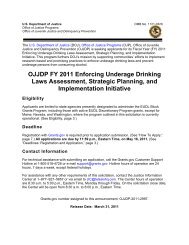
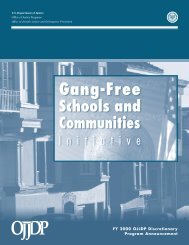
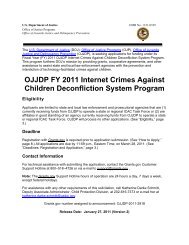
![Chapter 5 [PDF] - Office of Juvenile Justice and Delinquency ...](https://img.yumpu.com/46584340/1/190x245/chapter-5-pdf-office-of-juvenile-justice-and-delinquency-.jpg?quality=85)


